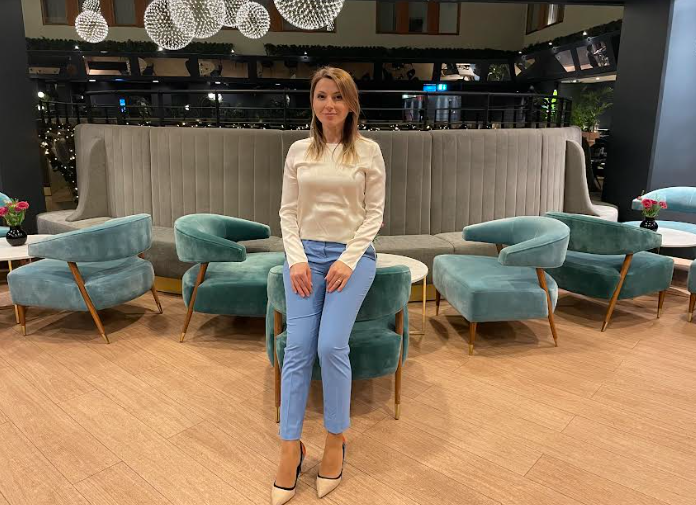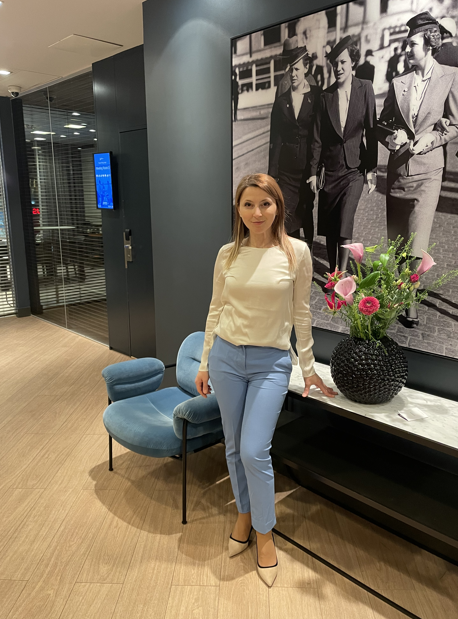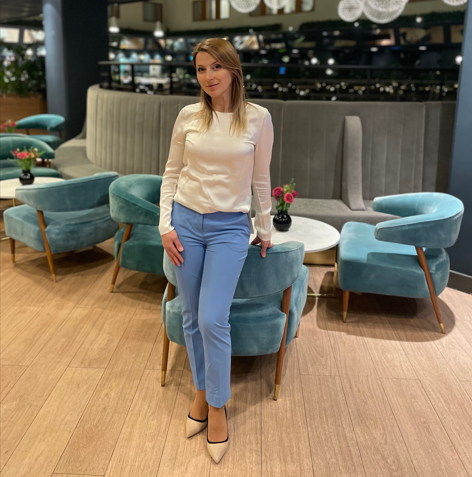Empowering First-Time Female Managers – Exclusive Interview With Mariya Arshaluysyan
- Brainz Magazine

- Jan 30, 2024
- 8 min read
Mariya, a leadership coach with an international career background within academia, discovered her calling in coaching during the lockdown.
She helps women lead with confidence by overcoming the challenges of transitioning into their first managerial roles.
Mariya believes first-time management is a transformational process and her leadership coaching methodology focuses on three main pillars: self-identity, personal performance, and team leadership.
As an authenticity advocate, Mariya believes authenticity is the key to fulfillment and she integrates authentic leadership practices into her transformational leadership coaching methodology.

Mariya Arshaluysyan, Leadership Coach & Founder
Introduce yourself! Please tell us about you and your life, so we can get to know you better.
I am a leadership coach with a research background in the field of Business Administration (Management) and international professional experience both at companies and in academia. I have worked in the field of Higher Education most of my professional life, however during the pandemic I discovered my calling in coaching and founded Mariya Arshaluysyan Leadership Coaching to help first-time female managers become confident leaders.
I am a big fan of neuroscience, psychology, and fancy bags.
Well, I was raised in a family of an entrepreneurial father and a bunch of tailors (my mother, my grandfather, and my aunt), so I inherited a little bit of both, I guess.
Although, fashion styling is more of a hobby. I was more involved in it when I was a child and was helping my aunt to recycle her fabrics by sewing clothes and bags for my dolls. However, I like exploring the psychology behind fashion styling and how it can be used as an effective non-verbal communication tool.
What inspired you to create this business - Mariya Arshaluysyan Leadership Coaching, and what specific goals or objectives did you have in mind when launching it?
The main inspiration source for creating this business was the willingness to make a bigger impact in leadership by using the power of transformation.
When I enrolled in a PhD program back in 2007, I was curious to explore why some organizations did well and others didn’t.
When I started digging deeper and finding out it was all about the people, I was inspired to study and explore how great leadership can make it and how poor leadership can break it.
The impact of leadership per se is fascinating, don’t you think so?
However, when I discovered coaching as a transformational tool, that was it.
I was very inspired by its impact on leadership development.
Transformation is at the core of my leadership development and coaching methodology.
Why did you decide to focus primarily on first-time leadership?
Well, firstly, there is a personal story involved.
Towards the end of my PhD studies, I was offered to lead a Training and Consulting Center based at that University where I was an Assistant Professor. It was the time when I thought I knew quite a bit about management and leadership as my research was focused on it and I was teaching it to different audiences – students and professionals in the field.
A few months into that new role, I started feeling quite disempowered and stressed.
I realized it was one thing to know and a completely different thing to put knowledge into practice.
Imagine a situation when you know about the impact of emotional intelligence on human performance and leadership success – you have researched it for a while - but you have no idea how to deal with your frustrations or the frustrations of your team members.
In my case, it led to many moments of helplessness.
So, it took me quite an effort to figure it all out to be able to succeed in my managerial role.
Now, I have a whole toolbox to help first-time managers with that and to help them avoid typical traps and mistakes.
Secondly, according to research, this is the segment that is least supported by organizations, even though this group needs the most support because the transition from a specialist role to a managerial role is a transformational process and it takes a professional identity change. It means you cannot just send them on a 3-day training or a longer course to learn some new tools and concepts.
This requires on-the-job training and guidance, because change is always about pushing your comfort zones and your ego gets in the way of keeping you safe.
In stressful situations, some people fly, some fight, and some freeze, it is so individual. All those reactions lead to various decisions and choices, that come from a place of fear and stress.
You need guidance to navigate those turbulences at an individual level. Those things don’t come out in a training setup, they emerge in real work situations, and you need to learn to go through them and process them until you embody them and no longer feel uncomfortable.
My unique leadership development methodology addresses various aspects and challenges of transitioning into the first managerial role.
Why did you choose to work with females?
I grew up empowered and knowing that I could have a great career and a great life if I chose to. I want to empower other women to not be bound by social stereotypes and norms.
I was also inspired to work with women, as a mother. I am a mother of two charming boys and I strive to be a good role model for them. You see at some point I just realized if we want our children to grow into happy and fulfilled individuals (I bet this is what all parents want for their children), it would be much easier if they see happy and fulfilled parents (role models) around them.
I want to help other women to be good role models for their children too.
In my experience, and it was backed up by Nobel Laureate Clara Boldin’s and other’s research, the main reason we lack women in leadership roles is not because of gender bias, etcetera, but because women lack confidence and they let gender “norms” guide their choices. I want to help women gain confidence and use their natural superpowers to make an impact and succeed as leaders.
I think it is important to help women realize that they can have both - great careers and personal lives. Then the next step is to help them get there.

Can you describe the primary content or services offered by your business, and who is your target audience?
I offer online one-on-one leadership coaching for female managers in their first managerial roles.
I also offer online leadership development coaching/facilitation services to organizations, in the form of yearly membership packages, to support them throughout the year.
Right now, I am preparing to test a beta version of my new online coaching program for organizations called “High-Performing First-Time Manager” and am looking for a company.
It aims to help specialists to transition into their managerial roles successfully, by getting the necessary support and skillset. The program addresses first-time managers’ challenges during the transition process.
As I mentioned earlier, the transition from a specialist role to a managerial role is a transformational process because it entails an identity shift. This program blends research in the fields of leadership development, neuroscience, behavioral science, and science of transformation to help first-time managers understand the nature of their role, develop self-awareness, and self-leadership, adopt effective habits, improve their performance, and develop top-notch leadership skills on the job, under my guidance.
It is a 6-month transformational on-the-job coaching program, with a biweekly commitment.
The program will be delivered LIVE and combines group- and one-on-one coaching.
If you could change one thing about your industry, what would it be and why?
I would like to see authenticity as the cornerstone of leadership development.
You see, there is no one-shape-fits-all formula in leadership. If this was the case, we would only have great leaders around us. Every person is unique and the best way to succeed in leadership is by understanding who they are, what they stand for, and what drives their choices.
This will naturally lead to “treating” leadership development as a holistic process. It is not just about learning frameworks for effective communication, delegation, etc., it is about character development and self-discovery, understanding how to make those frameworks work for you and others.
Leadership per se is a holistic process in a way, that your values, your beliefs, and your emotions will affect your decisions and choices. Because you are human – you are multi-dimensional. You have feelings that can be triggered, and you need to learn how to regulate your emotions and make decisions from an empowered rather than disempowered place.
We hear a lot of “motivational demands” about how one should act and show up as a leader. What I miss is understanding that the implementation of those demands requires deep personal development work.
When we talk about a holistic approach to leadership development, we embrace a growth mindset, because we accept that people can improve and change.
For example, we don’t say “This person is a people pleaser; she is not assertive enough to be a good leader. Period.” Instead, we understand that this pattern is not set in stone, it is deeply hidden and was shaped by certain personal experiences, but it can be changed. So, we say, “Let’s help this person figure out where her people-pleasing comes from, and let’s help her interrupt that pattern to become a better leader.”
In my practice, I have created a unique leadership development methodology that embraces all these aspects.
You emphasized authenticity as a cornerstone of leadership development. What does it mean to you?
If I could define it in three words, I would say it is about self-awareness, integrity, and transparency.
Self-awareness of who you are and what you stand for, of your values, of your choices.
Integrity is about staying true to your values along the way, it is about congruence in your actions and your communications. It is about prioritizing purpose over ego. It is about choosing the right (hard) things over easy things and being ethical.
Transparency is about not hiding who you are or not trying to show only the sides of you that benefit you in a certain situation. It is about not closing your eyes to things that are not okay and need to be discussed. It is about communicating openly about your choices, being open to feedback, and seeing it as a way to improve rather than a threat.
From a psychological perspective, you cannot be fulfilled if you are not authentic in what you do.
However, what I notice is people lack authenticity not because they don’t want to, but because they “learned” to be someone their environment expected from them. They try to fit in. They may take the “learned” behaviors for authenticity. Then when they achieve their goals, they feel empty – this is because they were chasing goals that did not belong to them.
Tell us about a pivotal moment in your life that brought you to where you are today.
During the lockdown, I was invited to supervise a thesis project of two Executive MBA students who were experiencing force majeure. They had chosen to write about the restaurant business, but due to the pandemic could not continue their research as restaurants were shut down. They had to choose a new topic in the middle of their thesis writing process, and it was about measuring the impact of the coaching approach in leadership on a company's performance. They wanted to do it for the company one of the students was employed with.
I remember I was very resistant to taking this group because I had no prior experience in coaching, and I was not sure if I could offer much value. However, at the last minute, I realized I sincerely wanted to help them. They were in a big panic as they would not be able to graduate without the thesis project.
Several months into that project, and one day as I was reading the final version of the thesis, I had an instant thought from nowhere.
“Oh, my God, I want to become a coach!”
I simply realized it was much more impactful to create transformation than to just share knowledge.
This was the beginning of it. The next thing I knew, was looking for a coaching certification program and did it with Mindvalley. Then I started a coaching business on top of my full-time job in academia.
If there was one thing you would wish the reader, what would it be?
No matter what you choose to do for life, seek to understand yourself and your choices. This is the first step towards authenticity, self-leadership, and the discovery of the fulfilling path that is awaiting you.










